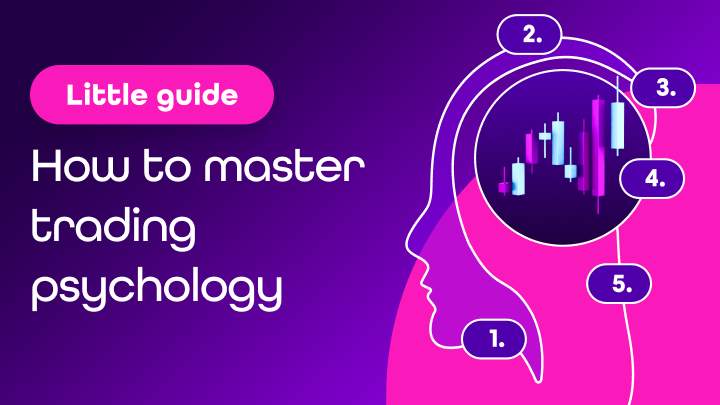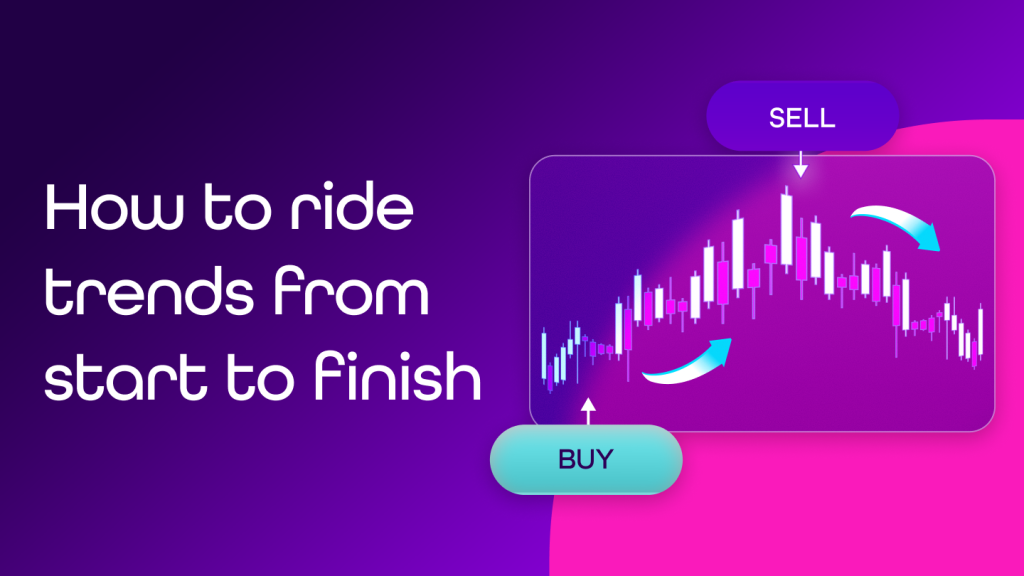Trading Psychology: Master your emotions and survive the market
A solid trading strategy or technical analysis might get you into the game. But if you want to stay in it long enough to win, you’ll need to master something even more important—yourself. This article will show you why the psychology of trading is the key to long-term success. You’ll learn how to deal with emotions, avoid mental traps, and build a mindset that keeps you grounded - especially when the market tries to shake you.

Why is trading psychology the key to success
Most beginner traders jump into the markets thinking it’s all about technical analysis, finding the right trading strategy, or timing the perfect entry. And yes, those things do matter.
But none of them will keep you afloat in the long run. The real challenge lies somewhere else—in your head.
Both research and real-world trading show that your mental game plays a bigger role than you might think. How you behave under pressure, how you react to loss, how you deal with temptation—all of it shapes your trading outcome.
Here’s a reality check: A big-data analysis of thousands of retail traders found that men tend to be more confident than women in trading—yet they perform worse. Why?
Because overconfidence leads to impulsive decisions and more frequent losses. Your mindset isn’t a bonus—it’s the foundation.
This article will guide you through emotional control, common mental pitfalls, and practical mindset-building that’ll help you stay in control—even when the market feels anything but.
Emotions in the market: Your worst enemy
If the market has ever slapped you in the face, chances are it wasn’t because of a bad analysis. It was because your emotions took over.
Fear. Greed. Hope. Regret. These are your most common psychological enemies—and they’re sneakier than you think. And yep, the data backs it up.
Let’s break it down:
- Most bad trading decisions happen in the early morning. That’s when mental focus is lower, you’re still waking up, and your routine might be off. Bad combo.
- After a big loss, traders tend to make even riskier trades. Trying to “win it back” pushes you outside your plan, and that spiral rarely ends well.
- Emotions are strongest in the first 3 months of trading. That’s when most impulsive trades and knee-jerk decisions happen—right when traders are least prepared to handle them.
And the thing is—you can’t prepare for this stuff just by reading books. You need systems and routines that actively manage your emotions, even when things go sideways. That’s exactly what we’ll dig into next.
Cognitive biases: The invisible pitfalls in your trading decisions
You might think your decisions are purely rational. But the human brain loves shortcuts—and in trading, these shortcuts can cost you. Here are the most common cognitive traps traders fall into:
Overconfidence – Thinking you’re better than you are
This one hits men the hardest. Studies show that men are more confident in their trading abilities than women, but that same overconfidence leads to more frequent losses. When you’re too sure of yourself, you skip analysis, ignore risks, and overtrade.
Anchoring – Getting stuck on entry price
You lock onto your entry point, and no matter what the market does, you’re just waiting for the price to come back. This leads to holding on to losing positions way too long.
Loss Aversion – Avoiding the pain of a loss
Losses hurt more than gains feel good. That’s why many traders close profitable trades too early and let losing ones drag on—just to avoid “taking the L.”
Herd Behavior – Following the crowd
Instead of trusting your own trading plan, you copy what everyone else is doing. Like jumping into trending trades or copying “influencer accounts.” The result? Late entries, bad exits, and trades with zero personal logic.
Constantly checking your trades
Watching your open positions all day only increases your stress and your chances of doing something stupid. Research shows that swing traders who check their trades multiple times a day perform worse overall.
Psychological tips for staying cool under pressure
Understanding your emotions isn’t enough—you need a game plan to deal with them in real time. The best traders don’t rely on luck or intuition. They build routines, habits, and tools that help them stay cool no matter what the market throws at them.
Here are some tips to level up your trading psychology:
- Build a daily routine: Studies show that successful traders stick to a stable daily routine. This helps reduce stress, sharpen decision-making, and prepare your brain for action. Just like athletes warm up, traders need mental prep too.
- Use a trading journal: Roughly 70% of top traders track their trades—and not just the numbers. They log their emotions, thoughts, and reasons for entering or exiting. Journaling helps you spot emotional patterns that are secretly wrecking your performance.
- Plan more, trade less: The best traders spend more time planning than executing. By mapping out multiple scenarios and entry/exit points in advance, they minimize impulsive trades and react with clarity—not panic.
- Train your mental resilience: Emotional strength is a skill, not a talent. Top traders use breathing exercises, meditation, or even workouts as part of their regular routine. It’s not a “nice-to-have.” It’s how you protect your mental capital.
- Prioritize discipline over complexity: According to multiple studies, emotional control is more important than technical knowledge. A simple strategy you stick to will always outperform a complex one you can’t handle under stress.
Building a “trader’s mindset”
Every trader hits a moment when the market tests them. You can have a plan, a backtest, a perfect entry—but when pressure hits, it’s your mindset that makes or breaks the trade. And no, mindset isn’t something you’re born with. You build it.
- Accept losses as part of the game: Winning traders don’t fear losses—they treat them like business expenses. They don’t need to be right all the time. They learn from mistakes and move on without the drama.
- Eliminate revenge trading: One of the worst traps for beginners is trying to “get back” at the market after a loss. The best traders avoid revenge trades completely, because they know it leads to emotionally-charged, money-burning decisions.
- Set daily/weekly loss limits: Mental fatigue builds up fast when you’re glued to your screen, desperate to find that “one more trade.” Most pros have a max-loss rule that forces them to step away when things go south—before they blow up their day.
- Surround yourself with growth-minded people: Trading solo doesn’t mean trading in isolation. Top traders seek out community, feedback, and mentorship. Learning from others helps you stay sharp, stay humble, and stay accountable.
- Consistency over complexity: Less is more. The best traders aren’t constantly switching strategies. They stick to a simple, repeatable system they know inside and out—and they run it with discipline. That’s what builds long-term stability and profitability.
Conclusion: Psychology is your edge
Sounds simple? It’s not. But it’s also not as hard as it seems. Trading psychology isn’t an add-on to your system. It is your system.
✅ It’s keeping your cool when the market turns against you.
✅ It’s owning your mistakes without letting ego take over.
✅ It’s a mental toolkit that protects you from your biggest threat—yourself.
Key takeaways
- You can’t shut off emotions—but you can understand and manage them.
- Most trading mistakes happen under pressure—often first thing in the morning or after a loss.
- Cognitive biases aren’t rare. They’re built into how we think.
- Daily routines, planning, journaling, and working on your mind and body are essential.
- The best traders aren’t the smartest. They’re the ones who can follow their plan—even when it’s hard.
💡 Remember
Your tools can give you an edge. But your mindset will either hold it—or snap it in two. So ask yourself: What are you going to work on today?
Resources
Martelli, D. (2017) ‘Chapter 11: The Psychology of Traders’, in Baker, H.K., Filbeck, G. and Ricciardi, V. (eds.) Financial Behavior: Players, Services, Products, and Markets. New York, NY: Oxford University Press, pp. 192–208. Available at: https://ssrn.com/abstract=2980726 (Accessed: 23 May 2025).
Yang, H. (2024) ‘Analysis of Retail Investors’ Trading Psychological Characteristics Based on Big Data’, Frontiers in Business, Economics and Management. Available at: https://doi.org/10.54097/wys60q35 (Accessed: 23 May 2025).
Wójcik, K. (2020) ‘The Characteristics of Successful Traders’, Biznesmaniak, 5, pp. 31–34. Available at: https://czasopisma.uni.lodz.pl/biznesmaniak/article/view/8327 (Accessed: 23 May 2025).
Bajo, E., Cecchini, M. and Oliver, B. (2023) ‘Psychological Profile and Investment Decisions’, Finance Research Letters. Available at: https://doi.org/10.1016/j.frl.2023.104245 (Accessed: 23 May 2025).Elder, A. (1993) Trading for a Living: Psychology, Trading Tactics, Money Management. New York, NY: John Wiley & Sons.


